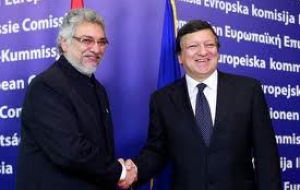MercoPress. South Atlantic News Agency
Mercosur and EU admit internal problems are delaying trade negotiations
 President Lugo and EC president Barroso admit difficulties
President Lugo and EC president Barroso admit difficultiesThe European Union and Mercosur admit they have internal problems that are delaying discussions, and results, for a broad association and cooperation accord that contemplates a trade agreement questioned by strong interests from both sides.
France together with Ireland and another ten EU countries fear a trade agreement will expose the farming sector to ‘cheap’ imports from Mercosur with negative consequences for the well being of farmers and rural employment.
This position has managed ample support from the European parliament and vocal farm lobbies that have tried to quantify the ‘damages’.
But Mercosur is not absent from controversy as was admitted by President Fernando Lugo from Paraguay that currently holds the rotating Mercosur chair. Lugo recently visited several EU countries and had a meeting with Jose Manuel Durao Barroso who is president of the European Commission.
“It is most legitimate that EU members don’t think alike and so it happens with Mercosur members”, said President Lugo who pointed out that the main difference rests in agriculture production and the opposite positions of Argentina and Brazil.
While Argentina is reluctant to relax its framework of trade regulations governing imports and exports, Brazil has been most enthusiastic about reaching an agreement.
Argentina imposes non automatic licences on imports depending on the surplus of its trade balance, taxes agriculture windfall earnings to help the Treasury and limits food exports randomly to privilege the domestic market and contain inflation.
However President Lugo said he remained optimistic since “we are talking of a trade zone that will benefit 750 million people” and while “there’s room for dialogue; optimism and the chances of reaching an agreement mutually beneficial ensures we will continue talks”.
EU and Mercosur agreed in May 2010 to retake trade negotiations and since then have celebrated a round of negotiations alternating between Brussels and Mercosur capitals.
“The truth is there are problems. EU/Mercosur negotiations are not easy but we have advanced in areas of political cooperation and we must keep advancing. We have agreed that both sides must continue to endeavour and come up with improved proposals”, said Durao Barroso.
Lugo reaffirmed that “we have the political commitment to overcome our difficulties, look for fundamental coincidences and share the political will that will enable us to transform the Mercosur production machinery”.
“We must open socio-political spaces to a more active participation from public opinion to help advance in this project which can only be beneficial for Mercosur and the European Union”, said Lugo.
Argentina and Brazil are currently in the midst of a trade spat because both countries have been applying non automatic import licences to a long list of products that have affected bilateral commerce.
Negotiations are ongoing and a way out is expected in coming weeks following a round of talks, the next to be held in Brasilia between Argentine Industry minister Debora Giorgi and her Brazilian peer Fernando Pimentel.




Top Comments
Disclaimer & comment rules-

Read all commentsInternational trade agreements are not a zero sum game for all traded commodities at all times, benefits fluctuate between trading partners, and to pretend to negotiate that all should be equal at all times is poor negotiation.
Jun 01st, 2011 - 08:09 pm 0It is not a zero sum game, and the real game is recognising SYNERGY and making it happen, so we get a win-win agreement.
Commenting for this story is now closed.
If you have a Facebook account, become a fan and comment on our Facebook Page!